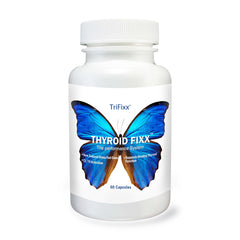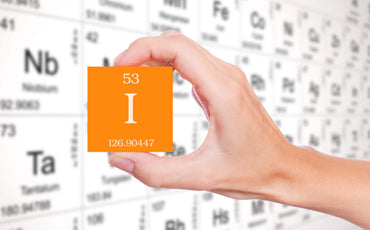
We have all heard a few things about the thyroid gland, however only a few people really know how important the thyroid is in the human body. The thyroid gland is an important organ in the human body playing principal roles in regulating different metabolic processes. This gland produces two major hormones – thyroxine and triiodothyronine. Thyroid problems can be a result of an overactive thyroid or underactive thyroid. With the help of the pituitary gland and the hypothalamus, the thyroid regulates the production of these hormones and strikes an important balance. Optimum thyroid care is necessary for the prevention of metabolic disorders and disease conditions of the thyroid. A substantial percentage of the population have an inherited undetected thyroid disorder, with a wide range of symptoms (subclinical hypothyroidism). Tri-Thyroid Fixx™ offers an extremely effective solution for those suffering with subclinical hypothyroidism, and can be monitored by consumers through measuring symptomatic relief.
INTRODUCTION: All About The Thyroid
The human body is a complex assembly of cells, tissues, organs and systems that are interconnected at the cellular level. Researchers have conducted different studies and clinical reviews to find out more about the natural components and functions of these systems. Over the years, the focus of biological science has been on the organs considered vital to overall wellbeing, such as the: heart, kidney, liver, brain, and intestinal organs. The thyroid, along with some other organs of the body, have been largely understudied, possibly due to their size and/or popularity in the population.
In essence, only a few people know how important the thyroid glands can be in normal humans. Recently, one of the most commonly asked questions in human biology has been:
‘How well do we all know the thyroid gland?’
To some circles, the thyroid is only a small organ enclosed in the neck region and considered responsible for hormonal production and control. Others simply think the thyroid is a vestige of human evolution playing no significant roles other than completing the organ makeup of a normal human body. Luckily enough, recent studies on hormonal activities and the body's biological regulatory systems have produced results suggesting that the thyroid can influence metabolic rate and hormonal production. These studies have rekindled interest in thyroid science and have opened up new knowledge fronts about the natural functions and importance of the thyroid. Unlike the ancient civilizations that think the thyroid is merely vestigial, we now know more about thyroid health and functioning.
Anatomy Of The Thyroid
The thyroid is a butterfly-shaped organ located in the neck, weighing between 20-60grams (0.7-2.1 ounces), and measuring 5cm (2 inches) in height, and 5cm (2 inches) in width, in the absence of any disease conditions. Found directly below the larynx (voice box), this organ is made of two prominent lobes surrounded by two fibrous capsules, located either side of the trachea (windpipe). The two lobes are connected in the middle by a thin area of tissue called the isthmus. The thyroid connectivity to the windpipe is flexible as the loose connective tissue between the thyroid capsules allows the thyroid to move slightly as we swallow. The architecture of the thyroid might appear a little bit complex; however, in a normal condition, the neck enclosure completely wraps the structures and usually makes it invisible from the outside, unless you have an enlarged thyroid.
In the innermost part of the thyroid, there are lots of small lobules enclosed in layers of thin connective tissues. Thyroid lobules, in their numbers, store numerous vesicles (thyroid follicles) that store thyroid secretions. Studies have also revealed that despite the small size of the thyroid, it nevertheless receives a rich supply of nutritious blood from the circulatory system. Predominantly, the thyroid receives blood from two principal sources – the superior thyroid artery and the inferior thyroid artery. The superior thyroid artery branches directly from the carotid artery and channels blood to the upper half of the thyroid. In the same fashion, the inferior thyroid artery branches directly from a subdivision of the subclavian artery to supply blood to the lower portion of the thyroid.
Regulation And Synthesis Of The Thyroid Hormones
The thyroid produces several hormones collectively referred to as the 'thyroid hormone’. In producing these hormones, the thyroid cells absorb and extract iodine from the blood as the building block for thyroid hormone synthesis. Thyroid hormone synthesis with iodine explains why medical experts recommend the healthy consumption of iodized food products for thyroid health. Majorly, there are two principal hormones produced and stored by the thyroid; these include thyroxine (T4) and triiodothyronine (T3).
Thyroid hormonal synthesis in itself is a complex process that involves an integral input from the pituitary gland. The thyroid gland's ability to produce and regulate the quantity of thyroid hormones in the body depends on the levels of thyroid-stimulating hormone (TSH) – a hormone produced by the pituitary gland. On the biological level, the pituitary gland can directly measure the quantity of thyroid hormones or rely on signals from the hypothalamus to coordinate thyroid hormone production. As a third party in thyroid hormone regulation, the hypothalamus can release its own hormone – thyrotropin-releasing hormone (TRH) – to stimulate the production of TSH from the pituitary gland. Responding directly to TSH levels, the thyroid can, in turn, decrease or increase the production and storage of thyroid hormones. The whole thyroid hormone production system involves the thyroid, pituitary and the hypothalamus, and is called the hypothalamic-pituitary-thyroid axis (HPT), which includes a feedback loop.

Functions Of The Thyroid Gland
Scientific studies on the biological functions of the thyroid gland have revealed that this organ contributes to a host of metabolic processes in the body. To directly examine the roles of the thyroid in these processes, researchers have characterized and studied the functions of the thyroid hormones. Triiodothyronine is a highly active hormone constituting about 20 percent of the total hormonal secretion of the thyroid. On the other hand, thyroxine is a relatively inactive prohormone, constituting about 80 percent volume of the total thyroid secretion. In some cells of the body, thyroxine (T4) is easily converted to the highly active free-triiodothyronine (FT3).
In 2012, a scientific review publication of the Journal of Clinical Investigation detailed findings on the mechanism of thyroid hormone action as suggested by clinical observations. Results from this review suggest that the thyroid hormones regulate the essential metabolic processes required for normal growth and development in humans, as well as the number of calories (kilojoules) you burn per day. These hormones also control energy balance, stimulates lipogenesis (fat) and lipolysis (lipids), regulates energy expenditure and storage, and plays principal roles in thermogenesis (heat generation). Additional hormone-producing cells in the thyroid –C-cells - also produce calcitonin. This hormone has long been known to be involved in the biological network responsible for the regulation of calcium and phosphate levels in the blood – an action necessary for normal growth and development of the bones.
If you suffer from some of the common symptoms hypothyroidism, such as cold hands and feet, always exhausted and tired, cannot lose weight, menstrual problems, brain and memory is slowing… yet your thyroid blood tests are in the normal range (subclinical hypothyroidism)? Then you may want to get a Thyroflex test to either confirm or quell your suspicions.
With the level of research reports available today, it is obvious that the thyroid deserves as much attention as other vital organs in the body.
Management Of Thyroid Problems With TriFixx™
The management of thyroid dysfunction with supplements is a fast emerging practice within the medical community. Supplements are considered an excellent alternative to conventional medicine in endocrine dysfunction management. These products have little or no adverse effects and are readily available in flexible dosage forms offering integrative therapy to various demographic distributions across the human population.
The TriFixx™ nutraceutical line is available as a non-prescription product offering a reliable treatment for correcting thyroid hormonal imbalances and dysfunctions. Thyroid Fixx™ for the T3 and T4 hormones, D3/K2 Fixx™ to open up the receptor pathways and iodine/iodide with selenium through Iodine Fixx™ to convert the T3/T4 into a usable form.
The Tri-Thyroid Fixx™ plan improves thyroid hormone levels by correcting abnormal cycles of thyroid hormone secretion. This trio also stabilizes the levels of thyroid-stimulating hormone and directly corrects thyroid dysfunction caused by a secondary cause. With TriFixx™, the therapy outcome is determined by the evaluation of symptom improvement and patients’ quality of life.
REFERENCES















